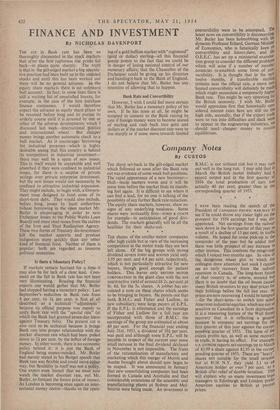Company Notes
By CUSTOS THE sharp set-back in the gilt-edged market which followed so soon after the Bank rate cut was evidence of some weak bull positions. The rapid appearance of a new borrower- Hull—made matters worse and it will be some time before the market finds its march- ing feet again. It is difficult to see where it can find a lead, for no one is talking of the possibility of any further Bank rate reduction. The equity share markets, however, show no signs of any underlying weakness. Some shares were noticeably firm—FORD & COATS for example—in anticipation of good divi- dends. The markets generally will be all the healthier for their shake-out.
THE shares of the smaller motor companies offer high yields but in view of the increasing competition in the motor trade they are best left alone. Of the big groups with strong dividend covers FORD and ROOTES yield only 3.95 per cent. and 4.8 per cent. respectively, which is not particularly attractive for new buyers, though good enough for patient holders. This leaves only BRITISH MOTOR CORPORATION in the giant class with the not unattractive yield of around £6 2s. per cent. at 8s. 6d. for the 5s. shares. A jobber has cir- culated a note on these shares which seems to be bringing in buyers. He points out that both B.M.C., and Fisher and Ludlow, its new subsidiary, were large payers of E.P.L. If the E.P.L. is eliminated and the earnings of Fisher and Ludlow for a full year are incorporated with those of B.M.C. the earnings of the group are estimated at about 40 per cent. For the. financial year ending July 31st, 1953, a dividend of 10f per cent. was paid and although some E.P.L. will be payable in respect of the current year some small increase in the final dividend declared in November is not impossible. The fruits of the rationalisation of manufacture and marketing which this merger of Morris and Austin brought about should now begin to be reaped. It was announced in January that new consolidating companies had been formed in Canada and Australia and that considerable extensions of the assembly and manufacturing plants at Sydney and Mel- bourne were being made. An investment in B.M.C. is not without risk but it may turn out well in the long run. I may add that in March the -British motor industry had a, record output and in the first quarter of 1954 the total production of cars was actually 40 per cent. greater than in the corresponding quarter of 1953.
*
I HAVE been reading the speech of the President of CANADIAN PACIFIC RAILWAY IC) see if he could throw any rosier light on the prospect for 1954 earnings but 1 was dis' appointed. Net earnings from the railwaY were down in the first quarter of this year as a result of a decline of 13 per cent. in traffic volume. He hoped for some pick-up in the remainder of the year but he added that there was little prospect of any increase in other income. This confirms the misgivings, which I voiced two months ago. In view of the dangerous wheat glut to which roY colleague drew attention last week I cannot see an early recovery from the railwaY recession in Canada. The long-term future of that country is, of course, assured but there is no doubt that the oil boom caused many British investors to pay dear prices for their holdings before the fall last year. As prices are now recovering I would be tempted —for the short-term—to switch into select American industrial equities, which are not so sensitive as Canadian to a farm depression, It is a reassuring feature of the Wall Street recovery that it is reflecting a general increase in company net earnings for the first quarter of this year against the corres' ponding quarter of 1953. The lapse of the excess profits tax, as well as some recovery in trade, is having its effect. For example, u.s. GYPSUM reports net earnings up to March of $3.99 a share against $2.95 in the corres; ponding quarter of 1953. These are "heavy shares not suitable for the small investor but at, $138 N.Y. they yield 5.1 to a° American holder or over 7 per cent. to a British after relief of double taxation. This will explain why so many investment trust managers in Edinburgh and London prefer American equities to British at present prices.


































 Previous page
Previous page